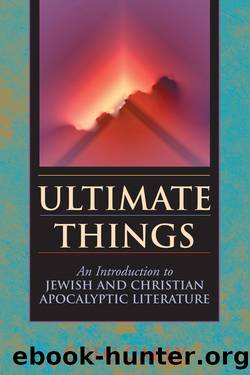Ultimate Things by Dr. Greg Carey

Author:Dr. Greg Carey
Language: eng
Format: epub
Publisher: Chalice Press
According to Streete, ascetic practices create space for personal freedom, an attempt to gain control over oneâs environment. She maintains that as social movements, both apocalypticism and asceticism
a.make radically dualistic distinctions between the ordinary and the ideal worlds
b.represent the present situation as the realm of Satan or the demonic
c.refuse to conform the self to the present situation or world
d.look beyond the present situation to another, ideal reality26
For example, some feminist scholars have noted that celibacy could free some women from the sexually determined conventions that bound them to particular men. The early Christian Acts of Paul and Thecla reveals how destabilizing celibacy could have been in the ancient world. A young woman named Thecla hears Paul proclaiming the gospel of celibacy, embraces it, and breaks off her engagement. Because it destabilizes society by bringing shame upon a prominent young man, her choice leads to persecution and, almost, to death. Likewise, celibate men could live free of attachment to place, status, or family origins. Whether or not this is what Paul believed or taught, that is in fact what he did. He traveled from one place to another, building alternative social networks.
Finally, celibate practices could beâand have beenâinspired by eschatological hope. Distinctly apocalyptic communities such as the one at Qumran (CD 12:1â2) and the audiences in the book of Revelation (14:1â5) attest to this. People could ground eschatological celibacy in two assumptions. On the one hand, they could believe that the end of this age lies at hand and that sexual activity poses an unnecessary diversion in a time of crisis. On the other hand, they could look ahead to the new age, in which people could live like the angels who, Jesus said, âneither marry nor are given in marriageâ (Mk. 12:25 par. Mt. 22:30; Lk. 20:35).
First Corinthians 7 reveals that all of these factors may have been at work in Paulâs mind. He counsels that those who are married âwill experience fleshly distressâ (7:28, authorâs trans.), which may reflect either celibacyâs philosophical or its countercultural dimensionsâor, very possibly, both. Paul has already identified self-control (akrasia and engkrateia) among his concerns (7:5, 9), but he also emphasizes mutuality rather than male domination (e.g., 7:4â5, 12â16). At the same time, he adds an eschatological clarification: âI am saying thisâ¦the time is drawing nearâ (7:29, authorâs trans.). âFor,â he adds, âthe present form of this world is passing awayâ (7:31).
Download
This site does not store any files on its server. We only index and link to content provided by other sites. Please contact the content providers to delete copyright contents if any and email us, we'll remove relevant links or contents immediately.
A Girl in a Million by Betty Neels(8723)
Enders Game 5 - Ender's Shadow by Orson Scott Card(4533)
Guilty Pleasures by Laurell K Hamilton(4448)
It: A Novel by Stephen King(2165)
The Art of Doom by Bethesda(2158)
Lords Of Avalon 01 - Sword of Darkness by Kinley MacGregor(2050)
Girl In A Million by Betty Neels(1928)
Dan Brown Omnibus by Dan Brown(1895)
World of Warcraft Chronicle Volume 3 by Blizzard Entertainment(1748)
Guilty Pleasures by Guilty Pleasures(1746)
The Pin-Up Art of Bill Ward by Bill Ward(1699)
Pillars of Eternity Guidebook by Obsidian Entertainment(1670)
Speaker for the Dead by Card Orson Scott(1664)
Pop Manga by Camilla D'Errico(1588)
Ender's Game 01 - Ender's Game by Orson Scott Card(1580)
Sabrina by Nick Drnaso(1573)
Sword Of Darkness by Kinley MacGregor(1563)
Sword of Darkness ~ Lords of Avalon Book 1 by Kinley MacGregor(1562)
Murder Mysteries by Neil Gaiman(1511)
